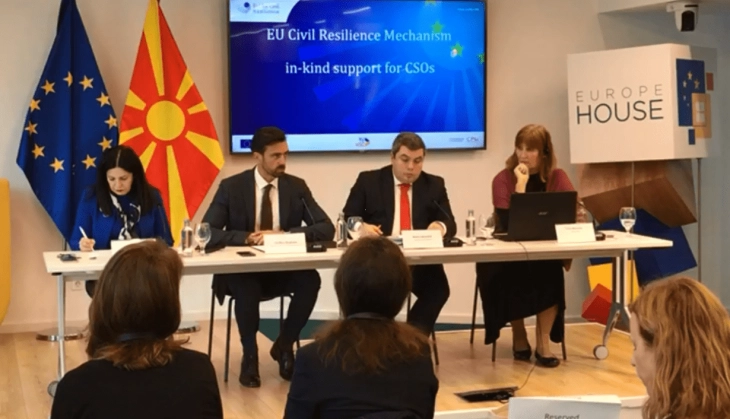Launch of the EU Civil Resilience Mechanism

Skopje, 8 November 2022 (MIA) - The role of civil society in the negotiation process is key. Thus, within the decision on the establishing accession negotiations of the Republic of North Macedonia to the EU, we have foreseen the possibility for representatives from civil society to participate in each working group for each negotiation chapter and cluster, Deputy PM for European Affairs Bojan Marichikj said Tuesday addressing the launching event of the European Union Civil Resilience Mechanism (EU CRM).
According to Marichikj, in a small country like ours, civil society organisations must be given space to make their contribution to the efficiency and effectiveness of the negotiations in a way that, according to the legal framework, they will participate in this process without changing the nature of their work.
Marichikj noted that this is a long-standing battle for European funds to reach small organisations at the local level, that is, to reach every citizen.
“This specific project is part of a series of projects funded by the EU through the Delegation for the support of civil society. This mechanism tends to expand in the legislative and institutional framework, as well as in the administrative capacities in order to be able to encourage the cooperation of the Government with the civil society and the maximum utilization of all capacities and opportunities and overcoming our weaknesses,” Marichikj said.
The implementation of the strategy for cooperation and development of civil society, adopted in December 2021 and its three-year action plan, which, as he said, referring to the Government's priority and continuous support for civil society, is underway, he noted.
“This strategy is the fourth in a row with a specific focus on improving the environment in which civil society functions and develops, which is very important in contributing to the strengthening of democratic governance, but also in promoting the European agenda in the country and moving the country forward towards the EU membership,” Marichikj said.
Steffen Hudolin, Head of Cooperation, Delegation of the European Union to the Republic of North Macedonia, addressing the event said that the civil society sector needs strategic support that will enable continuous operation and constant upgrading of capacities.
“For that reason, the sustainability of the civil society sector is one of our key goals as the EU here in North Macedonia, but also in the region. Over the past two decades, the partnership between the EU and the civil society sector in North Macedonia has expanded on all fronts, and the main channel of support to the civil sector is the IPA civil society facility instrument set up in 2008, which meant support for many challenges facing the region,” Hudolin said.
The new funding mechanism, i.e., the Civil Resilience Mechanism, will provide resources for the smallest and least experienced organizations, but major players for local communities. For the first time, the EU provides support to the civil sector and introduces in-kind support for civil activities.
“This mechanism should serve to inform citizens in a timely manner about the EU accession process and reforms in the country's sector and the impact on citizens' lives. The concept of the mechanism enables support of activities on the territory of the entire country, where it is difficult for organizations to receive support and the amount of almost a million euros has been allocated to support the activities of organizations for social cohesion and Covid-19 recovery. The mechanism is part of the EU-funded technical assistance project,” Hudolin noted.
EU Civil Resilience Mechanism (CRM), an in-kind support for civil society initiatives, was launched under the European Union funded project “Technical Assistance for improving the enabling environment for Civil Society Organisations in the Republic of North Macedonia”. The indicative amount of available funds under this call for proposals is 900,000 EUR.
The main objective of this Programme is contributing towards enhanced space and capacities of civil society for efficiently addressing the key reform priorities in their communities needed for further democratisation of the society.
In this respect, the CRM mechanism shall serve to enable grass-root civil society organisations to undertake efficient and effective actions to promptly respond to real needs in their communities and strengthen the citizens’ resilience during frequent social changes.







